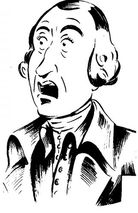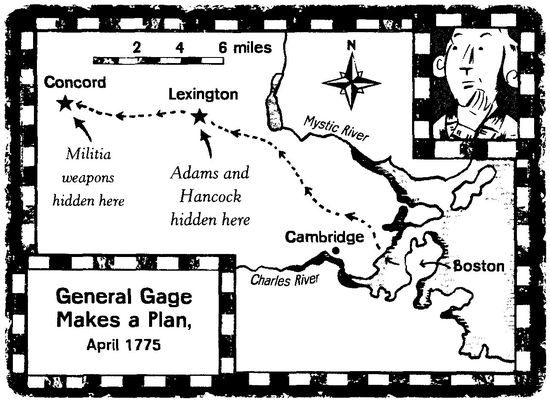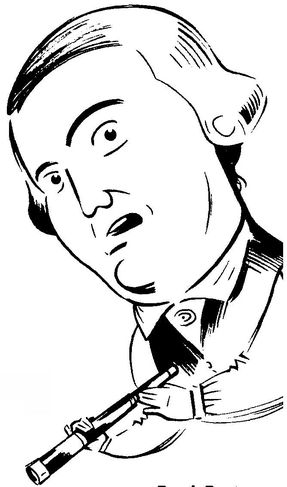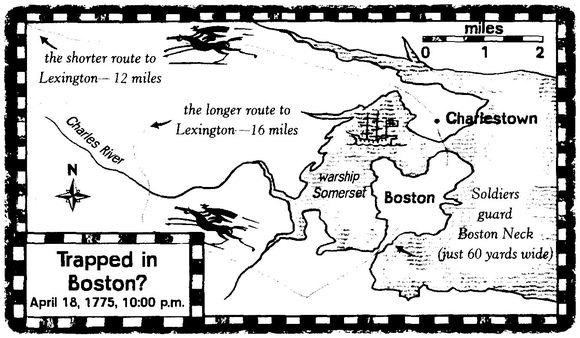King George (3 page)
Authors: Steve Sheinkin

T
he Continental Congress began in Philadelphia in early September 1774. There were a total of fifty-six delegates from twelve colonies (Georgia stayed home). Fifty-six men meant fifty-six different opinionsâand some very long debates. John Adams complained that if someone had declared that three plus two equaled five, members would have wasted a couple of days debating the issue.
he Continental Congress began in Philadelphia in early September 1774. There were a total of fifty-six delegates from twelve colonies (Georgia stayed home). Fifty-six men meant fifty-six different opinionsâand some very long debates. John Adams complained that if someone had declared that three plus two equaled five, members would have wasted a couple of days debating the issue.
So it took a while, but the members of Congress came to some serious decisions. They declared the Intolerable Acts to be an illegal violation of the rights of American colonists. They decided it was time to start boycotting trade with Britain again. And they agreed that the colonies should start arming and training their militias (volunteer armies) just in case there was trouble with the British soldiers in Boston.
Before the Congress ended, Patrick Henry did two things that he was famous for. One, he annoyed everyone by talking too much. And two, he made a few fabulous speeches. “The distinctions between Virginians, Pennsylvanians, New Yorkers and New Englanders are no more,” he cried. “I am not a Virginian, but an American.”
This kind of unity really surprised British leaders. They had been sure that the other colonies would stand aside and let Massachusetts suffer alone.
N
ow the stage was set for a showdown. Neither side really wanted war, but neither side was willing to back down. As usual, King George thought a show of force would improve matters. He declared: “The New England colonies are in a state of rebellion ⦠. Blows must decide whether they are to be subject to this country or independent.”
ow the stage was set for a showdown. Neither side really wanted war, but neither side was willing to back down. As usual, King George thought a show of force would improve matters. He declared: “The New England colonies are in a state of rebellion ⦠. Blows must decide whether they are to be subject to this country or independent.”
Blows, you say? Speaking in a church in Virginia, Patrick Henry did his thing:
“Gentlemen may cry, âPeace! Peace!' but there is no peace ⦠.
I know not what course others may take, but as for me, give me liberty or give me death!”
Back in Boston, all this tough talk was making General Gage extremely nervous. Unlike Patrick Henry and King George, Gage was going to have to do the actual fighting. He wrote to London, asking for more soldiers.
“If you think ten thousand men sufficient, send twenty,” Gage wrote. And this takes us up to April 1775. Right where we want to be.
Patrick Henry

What are you waiting for, Thomas Gage?
That was basically the message from London. King George wanted action! He wanted General Gage to march his soldiers out of Boston and seize the military supplies that were being stored by local militias. He wanted Patriot troublemakers like Samuel Adams and John Hancock arrested and shipped to London in chains.
That was basically the message from London. King George wanted action! He wanted General Gage to march his soldiers out of Boston and seize the military supplies that were being stored by local militias. He wanted Patriot troublemakers like Samuel Adams and John Hancock arrested and shipped to London in chains.

T
ensions in Boston were at record levels in the spring of 1775. General Gage was so worried about another Boston Massacreâtype incident, he refused to allow his soldiers to carry their pistols in the street. For this sound judgment, the soldiers called Gage “the Old Woman.”
ensions in Boston were at record levels in the spring of 1775. General Gage was so worried about another Boston Massacreâtype incident, he refused to allow his soldiers to carry their pistols in the street. For this sound judgment, the soldiers called Gage “the Old Woman.”
Meanwhile, in the towns around Boston, thousands of militia members were just waiting for the British soldiers to make a move. Some militias even called themselves “minutemen,” because they could be called together at a minute's notice (or pretty quickly, anyway).
Gage was sitting on a time bombâand everyone could hear the ticking.
But orders are orders. The general considered his options. He knew that the local militias were storing their weapons in Concord, a town just seventeen miles northwest of Boston. And he knew that Samuel Adams and John Hancock were lying low at a house in Lexington.
Interesting
⦠.
Interesting
⦠.
So Gage came up with a plan. He'd send seven hundred British soldiers out to Lexington and Concord. They could try to grab Adams and Hancock in Lexington. Then they could march on to Concord and destroy the military supplies there. That should make the king happy, right?
D
uring the afternoon of April 18, 1775, Gage sat down at his desk and wrote out orders for the mission. He sealed the plan in an envelope without showing it to anyone. He gave the envelope to Colonel Francis Smith, who was to lead the expedition. He told Smith to have his soldiers assemble on Boston Common, by the Charles River, at exactly ten o'clock that night. He ordered Smith not to open the envelope with the plan until then.
uring the afternoon of April 18, 1775, Gage sat down at his desk and wrote out orders for the mission. He sealed the plan in an envelope without showing it to anyone. He gave the envelope to Colonel Francis Smith, who was to lead the expedition. He told Smith to have his soldiers assemble on Boston Common, by the Charles River, at exactly ten o'clock that night. He ordered Smith not to open the envelope with the plan until then.
Why would Gage keep the plan secret from the man who was going to lead the mission? Gage knew that it was going to be very dangerous for his soldiers to march out into the hostile territory around Boston. His hope was to keep the march secret until the very last second. Then his soldiers just might be able to get out to Concord and back before the minutemen had time to react.

Would Gage be able to keep the plan a secret? Listen to this: At about nine o'clock that night, Gage called his pal General Hugh Percy into his office and told him the plan. He told Percy that no one else knew of the plan yet.
Minutes later, Percy left Gage's house and walked out into Boston Common. He saw that British soldiers were quietly gathering down by the water, as planned. And he saw small groups of people, nosy Bostonians, standing around, watching the action. He snuck up to one group. His face hidden by shadows, Percy joined the conversation:
Bostonian:
The British troops have marched, but will miss their aim.
The British troops have marched, but will miss their aim.
Percy:
What aim?
What aim?
Bostonian:
Why, the cannon at Concord.
Why, the cannon at Concord.
So the secret was already outâeven before the British soldiers themselves knew where they were going! Percy rushed back to Gage's office and told him the bad news.
H
ow did this happen? A story went around that Gage's wife (she was American) had leaked the plan. But this was never more than a rumor. The real problem, from Gage's point of view, was that almost everyone in Boston was a spy. Well, maybe not an official spy, but everyone in town was keeping an angry eye on those hated British soldiers.
ow did this happen? A story went around that Gage's wife (she was American) had leaked the plan. But this was never more than a rumor. The real problem, from Gage's point of view, was that almost everyone in Boston was a spy. Well, maybe not an official spy, but everyone in town was keeping an angry eye on those hated British soldiers.
One of the men who organized this American spy ring was a silversmith named Paul Revere.
“I was one of upwards of thirty who formed ourselves into a committee for the purpose of watching the movements of the British soldiers.”
Paul Revere

People outside the city were also on the lookout. When General Gage first started thinking about sending his soldiers out to Concord, he realized that he would need to know more about the roads the army would have to take. He gave Colonel Francis Smith the job of secretly checking out the route. Smith took along a young private named John Howe.
Smith and Howe dressed up like American laborers (you know: gray overcoat, leather pants, blue stockings). They grabbed a couple of walking sticks and set off on the seventeen-mile hike to Concord. Smith didn't make it too far before getting hungry (he was a famously big eater). So the two men went into a roadside tavern, sat at a table, and ordered some breakfast.
Pretending to be a regular old American in search of a job, Smith asked the waitress if she knew of any place where he and his friend might find some employment. But the woman (all we know about her is that she was African American) had spent a lot of time in Boston,
and she knew the faces of the high-ranking British officers. She looked him in the eye and said:
and she knew the faces of the high-ranking British officers. She looked him in the eye and said:

“Smith, you will find employment enough for you and all Gage's men in a few months.”
Smith just about fell off his chair. He called the woman a “saucy wench” and promised to kill her if he ever saw her again. Then he ran home. “The last I saw of Smith he was running through barberry bushes to keep out of sight of the road,” said Private Howe.
You get the ideaâthe British couldn't make a move without everyone knowing about it. And by April 18, it was really, really obvious that something was going on in Boston. British officers were stopping by the stables, making sure their horses were ready to go. Totally ignoring the lowly local kids who worked as stable boys, the officers bragged about the upcoming action. The stable boys passed the information on to Paul Revere.
Another clue: the British repaired their small transport boats and launched them in the Charles River. These were the boats the British soldiers would use if they ever wanted to cross the river on their way to Lexington and Concord. As Revere noted, “From these movements we expected something serious was to be transacted.”
“S
o Revere and his fellow spies knew the British were about to do “something serious.” But what?
o Revere and his fellow spies knew the British were about to do “something serious.” But what?
It really wasn't that hard to guess. Everyone knew about the weapons in Concord, and everyone knew that King George wanted them destroyed. Everyone also knew that the king wanted John Hancock and Samuel Adams arrested. British soldiers made no secret of their hostile feelings for Hancock and Adams. One popular British marching chant went like this (you can sing along to the tune of “Yankee Doodle”):
“As for their King, John Hancock, and Adams if they're taken, their heads for signs shall hang on high, upon that hill called Beacon.”
It doesn't exactly rhyme, but you get the point: Hancock and Adams were wanted men. Any time your head is hanging up as a sign, it's not good.
On the night of April 18, British soldiers were gathering by the river. Revere and friends knew what they had to do. First: warn Hancock and Adams that British soldiers were on their way to arrest them. Second: alert the people of Concord that the British were coming to destroy the weapons stored there.
Easier said than done. Boston was nearly surrounded by water, so to get out of the city they had to either cross the Charles River or make it over the thin strip of land called Boston Neck. And of course,
Gage knew that Revere and other express riders would try to get a warning out to Lexington and Concord. Gage issued strict orders to his men: let no one out of Boston tonight! He moved the warship
Somerset
into the river to block any exit by boat. He placed a string of soldiers across Boston Neck (it was only sixty yards wide). He even sent out groups of British officers on horseback, pistols hidden under their coats, to patrol the road to Lexington and Concord.
Gage knew that Revere and other express riders would try to get a warning out to Lexington and Concord. Gage issued strict orders to his men: let no one out of Boston tonight! He moved the warship
Somerset
into the river to block any exit by boat. He placed a string of soldiers across Boston Neck (it was only sixty yards wide). He even sent out groups of British officers on horseback, pistols hidden under their coats, to patrol the road to Lexington and Concord.

T
here was a real chance that no one would be able to get out of Boston with a warning for the nearby towns. But don't worry: Revere and friends had a back-up plan. They arranged to send a secret signal by lighting lanterns at the top of Old North Church in Boston. The lanterns would be visible across the Charles River in Charlestown. This way, if no one could get out of Boston with the latest news, at least people in Charlestown could begin spreading the alarm that the British were on their way.
here was a real chance that no one would be able to get out of Boston with a warning for the nearby towns. But don't worry: Revere and friends had a back-up plan. They arranged to send a secret signal by lighting lanterns at the top of Old North Church in Boston. The lanterns would be visible across the Charles River in Charlestown. This way, if no one could get out of Boston with the latest news, at least people in Charlestown could begin spreading the alarm that the British were on their way.
It was agreed that one lantern would mean the British were
marching out by land, over Boston Neck. Two lanterns would mean the British were coming by water, over the Charles River. Yes, these are the “One if by land, and two if by sea” lanterns from the famous Henry Wadsworth Longfellow poem.
marching out by land, over Boston Neck. Two lanterns would mean the British were coming by water, over the Charles River. Yes, these are the “One if by land, and two if by sea” lanterns from the famous Henry Wadsworth Longfellow poem.
The guy who volunteered to hang the lanterns was a young sexton at Old North Church, Robert Newman. A sexton cleans up the place, rings the church bells, stuff like that. Newman didn't like the job, but he kept it, he said, “because times are so hard.”
Now it was just before ten o'clock, and Newman was ready for action. The first thing he did was say good night to his mom. And not just because he was a good son. British officers were renting rooms in the family house, and at this moment they were sitting around playing cards in the living room. Newman wanted the officers to think he was going to bed for the evening. In fact, he went up to his room, climbed out the window, climbed over the roof, and jumped down into the dark shadows in front of the church.
Revere found Newman there at a little after ten o'clock. Maybe Revere held up two fingers to silently show Newman that the British were moving out by waterâthis was clear by now, since the British soldiers were already gathering by the river. Newman knew what to do. He used his keys to unlock the church doors. He took two lanterns from the closet, climbed the stairs to the top of the bell tower, and lit the lanternsâbut only for a moment. He didn't want the signal to be spotted by anyone on the warship
Somerset
, which was clearly visible in the water below.
Somerset
, which was clearly visible in the water below.
Then Newman went down the stairs, put the lanterns back, leapt out a window in the back of the church, climbed up and over the roof of his mother's house, dropped in through the window of his bedroom, and lay down in bed.
You think he slept that night?
Other books
Forbidden Paths by Belden, P. J.
The Dead Do Not Improve by Jay Caspian Kang
Just One Look (2004) by Coben, Harlan
The Visconti House by Elsbeth Edgar
The Caller by Juliet Marillier
Meet Me Under the Mistletoe by JoAnn Durgin
Fair Catch (Love and Sports Series) by Quinn, Meghan
The Survivor Chronicles: Book 1, The Upheaval by Erica Stevens
Bred by Her Cowboy by Jillian Cumming
Slaves of the Swastika by Kenneth Harding